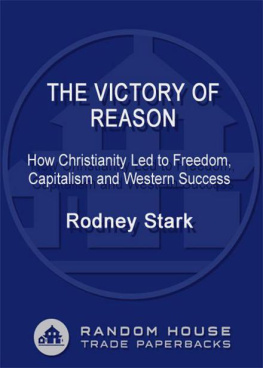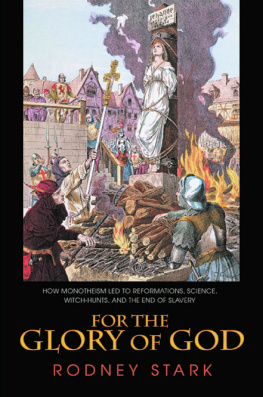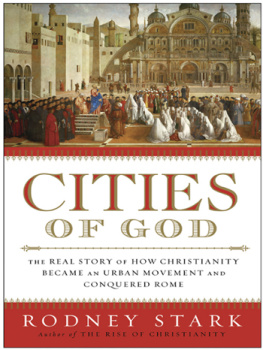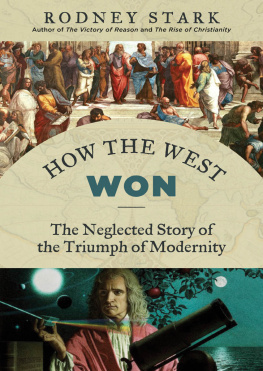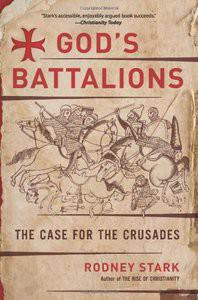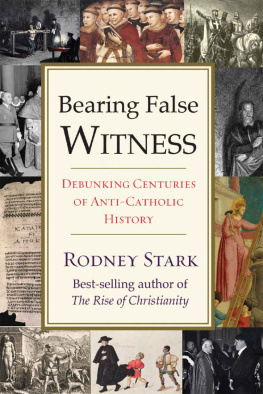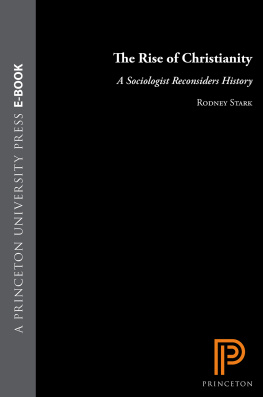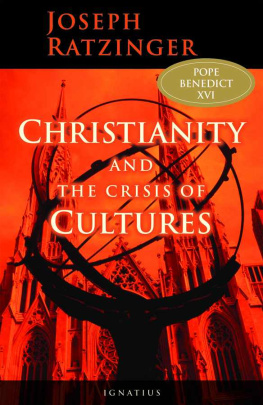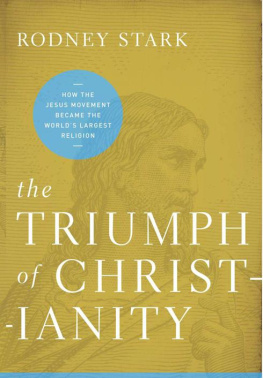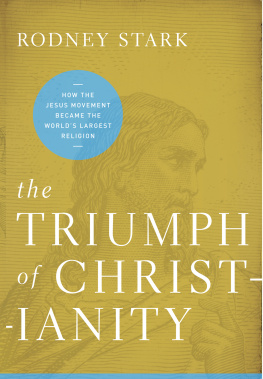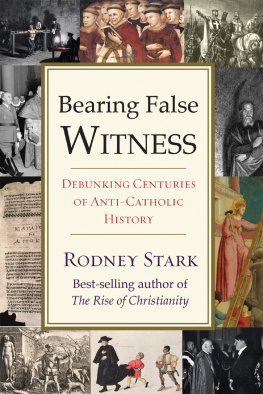
Table of Contents
Praise for The Victory of Reason
Rodney Stark is at it again.... The Victory of Reason is another bold, sharply argued defense of Christian faiths social benefits. It is also an in-your-face challenge to antireligious assumptions of the modern academy.
Christianity Today
All of us can learn much from Mr. Starks work. Secularists, instead of scorning the past, should learn how Christian understanding led to the most significant intellectual, political, scientific, and economic breakthroughs of the past millennium.
World
Succinct, highly interesting, and very helpful... this book offers arresting facts and passion-arousing arguments, but it also, and most dramatically, alters the horizon within which we wrestle with them.
The New Criterion
Stimulating and provocative... [Stark] demonstrates that elements within Christianity actually gave rise not only to visions of reason and progress but also to the evolution of capitalism.
Publishers Weekly
Every once in a while a book comes along that not only provides new answers but also transforms the old questions. The Victory of Reason is such a book.
THE REVEREND RICHARD JOHN NEUHAUS, editor in chief of First Things, and one of the 25 Most Influential Evangelicals in America ( Time )
A bracing antidote to the secularist smog that chokes education today.
GEORGE WEIGEL, Ethics and Public Policy Center
Rodney Stark may be the most influential religious researcher of the past hundred years. He has revolutionized contemporary thought about religion and economics, and in this bookhis most provocative yethe makes a compelling case for the claim that we owe our prosperity, freedom, and progress to centuries of faith in one great, loving, and rational God. The Victory of Reason is itself a victory of reason in a field long dominated by anti-Western, anticapitalist, and antireligious myth. Starks extraordinary scholarship has made it possible to again ask, and perhaps finally answer, some of the most enduring questions about faith and spirituality.
LAURENCE IANNACCONE, Koch Professor of Economics, George Mason University
INTRODUCTION
Reason and Progress
When Europeans first began to explore the globe, their greatest surprise was not the existence of the Western Hemisphere but the extent of their own technological superiority over the rest of the world. Not only were the proud Mayan, Aztec, and Inca nations helpless in the face of European intruders; so were the fabled civilizations of the East: China, India, and even Islam were backward by comparison with sixteenth-century Europe. How had this happened? Why was it that although many civilizations had pursued alchemy, it led to chemistry only in Europe? Why was it that, for centuries, Europeans were the only ones possessed of eyeglasses, chimneys, reliable clocks, heavy cavalry, or a system of music notation? How had nations that had arisen from barbarism and the rubble of fallen Rome so greatly surpassed the rest of the world?
Several recent authors have discovered the secret to Western success in geography. But that same geography long sustained European cultures that were well behind those of Asia. Others have traced the rise of the West to steel, or to guns and sailing ships, and still others have credited a more productive agriculture. The trouble is that these answers are part of what needs to be explained: why did Europeans excel at metallurgy, shipbuilding, or farming? The most convincing answer to these questions attributes Western dominance to the rise of capitalism, which also took place only in Europe. Even the most militant enemies of capitalism credit it with creating previously undreamed of productivity and progress. In The Communist Manifesto, Karl Marx and Friedrich Engels proposed that prior to the rise of capitalism, humans engaged in the most slothful indolence and that the capitalist system was the first to show what mans activity can bring about... [it] has created more massive and more colossal productive forces than all the preceding generations together. Capitalism achieves this miracle through regular reinvestment to increase productivitythrough either greater capacity or improved technologyand by motivating both management and labor through ever-rising payoffs.
Supposing that capitalism did produce Europes great leap forward, it remains to be explained why it developed only in Europe. Some have found the roots of capitalism in the Protestant Reformation; others have traced it back to various political circumstances. But if one digs deeper, it becomes clear that the truly fundamental basis not only for capitalism but for the rise of the West was an extraordinary faith in reason .
The Victory of Reason explores a series of developments in which reason won the day, giving unique shape to Western culture and institutions. The most important of these victories occurred within Christianity. While the other world religions emphasized mystery and intuition, Christianity alone embraced reason and logic as the primary guide to religious truth. Christian faith in reason was influenced by Greek philosophy. But the more important fact is that Greek philosophy had little impact on Greek religions. These remained typical mystery cults, in which ambiguity and logical contradictions were taken as hallmarks of sacred origins. Similar assumptions concerning the fundamental inexplicability of the gods and the intellectual superiority of introspection dominated all of the other major world religions. But from early days, the church fathers taught that reason was the supreme gift from God and the means to progressively increase their understanding of scripture and revelation. Consequently, Christianity was oriented to the future, while the other major religions asserted the superiority of the past. At least in principle, if not always in fact, Christian doctrines could always be modified in the name of progress as demonstrated by reason. Encouraged by the Scholastics and embodied in the great medieval universities founded by the church, faith in the power of reason infused Western culture, stimulating the pursuit of science and the evolution of democratic theory and practice. The rise of capitalism was also a victory for church-inspired reason, since capitalism is in essence the systematic and sustained application of reason to commercesomething that first took place within the great monastic estates.
During the past century, Western intellectuals have been more than willing to trace European imperialism to Christian origins, but they have been entirely unwilling to recognize that Christianity made any contribution (other than intolerance) to the Western capacity to dominate. Rather, the West is said to have surged ahead precisely as it overcame religious barriers to progress, especially those impeding science. Nonsense. The success of the West, including the rise of science, rested entirely on religious foundations, and the people who brought it about were devout Christians. Unfortunately, even many of those historians willing to grant Christianity a role in shaping Western progress have tended to limit themselves to tracing beneficial religious effects of the Protestant Reformation. It is as if the previous fifteen hundred years of Christianity either were of little matter or were harmful. Such academic anti-Catholicism inspired the most famous book ever written on the origins of capitalism.
At the start of the twentieth century, the German sociologist Max Weber published what soon became an immensely influential study: The Protestant Ethic and the Spirit of Capitalism. In it he proposed that capitalism originated only in Europe because, of all the worlds religions, only Protestantism provided a moral vision that led people to restrain their material consumption while vigorously seeking wealth. Weber argued that prior to the Reformation, restraint on consumption was invariably linked to asceticism and hence to condemnations of commerce. Conversely, the pursuit of wealth was linked to profligate consumption. Either cultural pattern was inimical to capitalism. According to Weber, the Protestant ethic shattered these traditional linkages, creating a culture of frugal entrepreneurs content to systematically reinvest profits in order to pursue ever greater wealth, and therein lies the key to capitalism and the ascendancy of the West.
Next page
